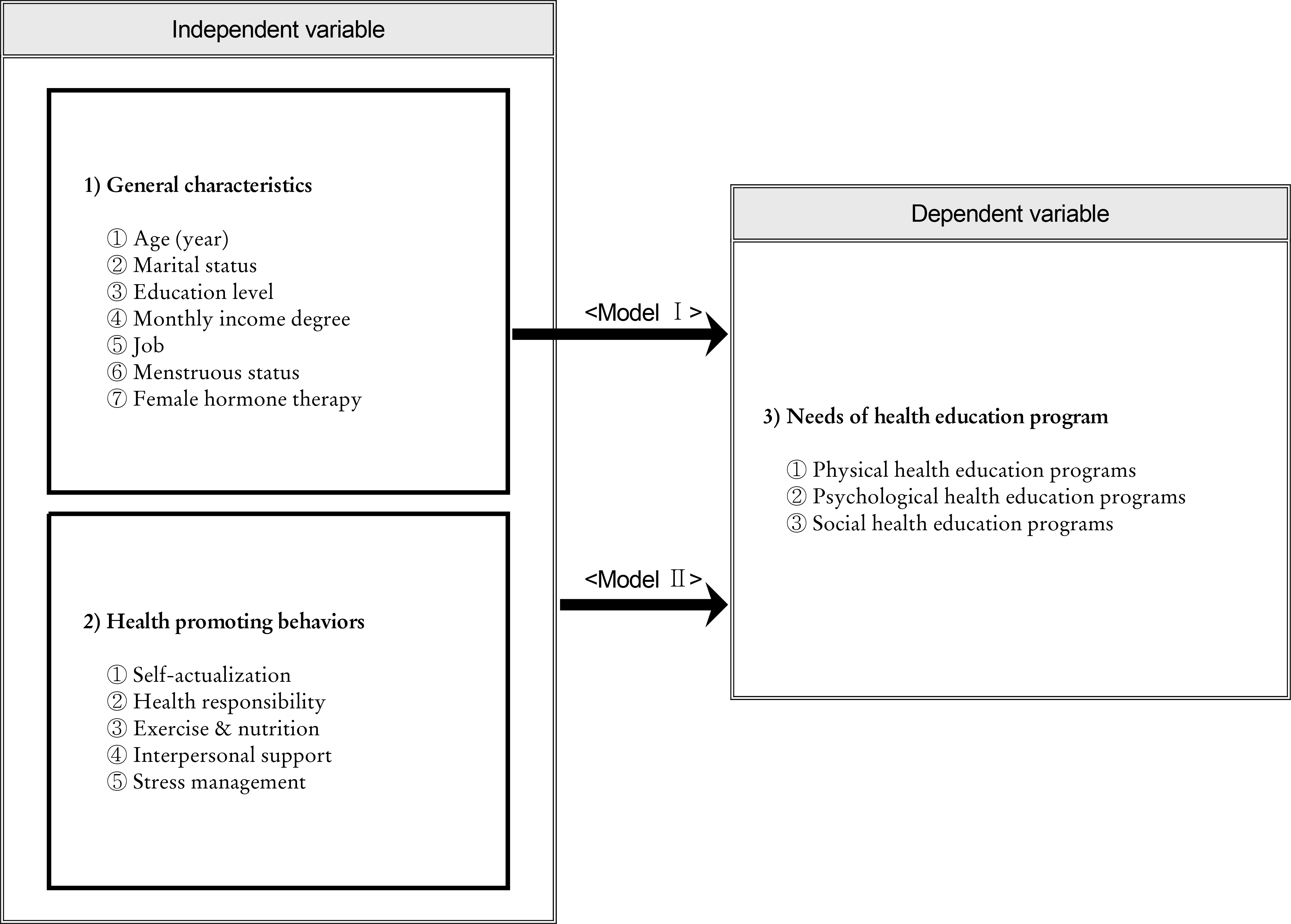Korean J Health Promot.
2015 Jun;15(2):63-74. 10.15384/kjhp.2015.15.2.63.
Analysis of Factors Affecting the Need for Health Education Programs in Middle-aged Women
- Affiliations
-
- 1Educational Administration Major, Kangnam University the Graduation School of Educate, Yongin, Korea.
- 2Department of Education, Kang Nam University of Teacher's College, Yongin, Korea. chango@kangnam.ac.kr
- KMID: 2247074
- DOI: http://doi.org/10.15384/kjhp.2015.15.2.63
Abstract
- BACKGROUND
This study aimed to analyze the factors affecting health education program needs as defined by the World Health Organization (WHO) for promoting health in middle-aged women.
METHODS
Study subjects included 203 middle-aged women ranging in ages between 40 and 59 years, living in S-city. Data were collected from September 10 to 24, 2011. Descriptive statistics, independent t-test, and one-way ANOVA were used to analyze general characteristics and the need for health education programs related to the general characteristics. Hierarchical multiple regression was used to access the factors influencing the need for health education programs. All data were analyzed by SPSS/WIN 17.0 program.
RESULTS
The average score of the health promotion behaviors was 3.46 (+/-0.74). The average score of the need for health education programs (including physical, psychological, and social health education programs) was 3.88 (+/-0.13); and this was affected by age (psychological health education programs beta=-0.21), self-actualization (physical, psychological, social health education programs beta=0.28, beta=0.30, beta=0.30), health responsibility (social health education programs beta=0.21), interpersonal support (physical health education programs beta=0.18), and stress management (social health education programs beta=0.18).
CONCLUSIONS
Based on the study results, health education for middle-aged women should be impacted less by monthly income and educational background, and should have more specialized, accessible contents considering not only programs that middle-aged women prefer but also the factors influencing the needs of health education.
Figure
Reference
-
1.Kim MK. A study of relationship between health promoting behavior indices and quality of life indices [dissertation]. Seoul: Yonsei University;2001.2.Kim MJ. A study on factors affecting the quality of north Korean female defectors' subjective life [dissertation]. Pyongtaek: Pyongtaek University;2008.3.Bergner M. Quality of life, health status and clinical research. Med Care. 1989. 27(3):148–56.
Article4.World Health Organization. Frequently asked questions. WHO. 2014. [Assessed August 8, 2014].http://www.who.int/suggestions/faq/en/.5.Kim YT., Ahn SS., Chung JJ., Choi SW. Korean women's health conditions and policy agenda-10. Seoul: KWDI;2008. [Assessed August 8, 2013].http://www.kwdi.re.kr/reportList.kw?currtPg=3&sgrp=S01&siteCmsCd=CM0001&topCmsCd=CM0002&cmsCd=CM0004&pnum=1&cnum=0&sbjCdSel=&rptCdSel=&src=INCHARGE_NM&srcTemp=%EA%B9%80%EC%98%81%ED%83%9D.6.Korea Statistical Information Service. Seoul: KOSIS;2010. [Assessed August 8, 2014].http://kosis.kr/statisticsList/statisticsList_01List.jsp?vwcd=MT_ZTITLE&parentId=A#SubCont.7.Hong YR., Hyun YS., Jung HR. The International Comparative Study of Social Outcomes of Learning. Seoul: KEDI;2008. [Assessed August 8, 2013].https://www.kedi.re.kr/khome/main/research/selectPubForm.do.8.Kim MC. Mid life crisis and it's related variables [dissertation]. Seoul: Ewha Womans University;1988.9.Lee SJ. A Study on the Women's Adult & Continuing Education in Korea [dissertation]. Seoul: Dan Kook University;2007.10.Lim SK. An sem analysis on participation out comes and effect factors of female adult learners [dissertation]. Busan: Dong-A University;2007.11.Chung YC., Han KS. Psychoneuroimmunology: stress, depression, schizophrenia and the immune system. J Korean Neuro-psychiatr Assoc. 1992. 31(5):825–36.12.Kim SJ. A study of relationship between health promoting lifestyle, depression, quality of life among middle aged women [dissertation]. Suwon: Ajou University;2007.13.Kim JH. Physical, psychological and social education needs of the Korean elderly. J Korean Acad Soc Nurs Edu. 2005. 11(2):260–9.14.Erdfelder E., Faul F., Buchner A. GPOWER: a general power analysis program. Behavior Research Methods, Instruments, & Computers. 1996. 28(1):1–11.
Article15.Suh YO. Health promoting lifestyle, hardiness and gender role characteristics in middle-aged women. J Korean Acad Womens Health Nurs. 1996. 2(1):119–34.16.Kang YS. A research on lifelong education programs for women implemented by some institutes in Seoul [dissertation]. Seoul: Korea National Open University;2004.17.Kim GO. Comparative analysis of program in women lifelong education institutions [dissertation]. Suwon: Ajou University;2005.18.Kim YS. A comparison and analysis of the educational goals and programs in lifelong education institutions attached to women's universities [dissertation]. Seoul: Ewha Womans University;2002.19.Kim CG. The needs analysis of middle aged women in aging society [dissertation]. Seoul: Korea University;2002.20.Park HA., Park YS., Oh HS., Kim HJ. Development of health information program for the middle aged women. Korean J Women Health Nurs. 2002. 8(2):165–76.
Article21.Shin YH. A Study of Female Farmers' Needs on Lifelong Education Programs [dissertation]. Inchon: INHA University;2008.22.Ajou University Educational Training Institute Group. Health Training of Health Curriculum for Health Teacher. 2011. 86–98.23.Chun HK. A study on the health education needs assessment of middle aged women [dissertation]. Seoul: Ewha Womans University;1997.24.Kim YD. An application of delphi and analytic hierarchy process method to elderly physical training policy [dissertation]. Seoul: Korea University;2007.25.Fehring RJ. Methods to validate nursing diagnoses. Heart and Lung. 1987. 16(6):625–9.26.Chung V., Wong E., Griffiths S. Content validity of the integrative medicine attitude questionnaire: Perspectives of a Hong Kong Chinese expert panel. J Alternative Complementary Med. 2007. 13(5):563–70.
Article27.Lee GS. Relationship between cognitive-perceptual factors and health promoting lifestyle of middle aged women [dissertation]. Seongnam: Gachon University;2006.28.Park BY. Factors influencing the health promotion behaviors among middle-aged women [dissertation]. Seoul: Ewha Womans University;2008.29.Maslow A. Motivation and personality. 3rd ed.Paju: Book21;2009. p. 10–530.30.Acton GJ., Malathum P. Basic need status and health promoting self-care behavior in adults. West J Nurs Res. 2000. 22(7):796–811.31.Park JS., Lee YE. Effects of integrated menopause management program for middle aged woman. Korean J Women Health Nurs. 2011. 17(1):10–20.
Article32.Hudson T. Managing perimenopausal symptom: an integrative medicine approach. Female Patient. 2001. 26(8):33–40.33.Han SH. A study on the menopausal symptoms, menopausal management and quality of life in middle aged women [dissertation]. Seoul: Ewha Womans University;2004.34.Lee DS. Effects of a marital growth program on middle-aged couples. J Korean Family Ther. 2008. 16(1):81–111.
- Full Text Links
- Actions
-
Cited
- CITED
-
- Close
- Share
- Similar articles
-
- The Mediating Effect of Self-efficacy in the Relationship between Diabetes Knowledge and Health Promoting Behaviors: Focus on Gender Differentiation
- A Study on the Relationship among Climacteric Symptoms, Knowledge of Menopause and Health Promoting Behavior in Middle-Aged Women
- Factors Affecting on Health Promoting Behaviors among Teachers with Middle-aged Women Experiencing Menopause
- Factors Affecting the Successful Aging of Late Middle-Aged Adults
- Belief, Knowledge, and Practice about Oral Health Care of Middle-aged Women


